
 Wednesday, June 26, Twelfth Week in Ordinary Time
Wednesday, June 26, Twelfth Week in Ordinary Time
 ST. JOSEMARIA ESCRIVA DE BALAGUER (b Spain 1902, d Rome 1975), Priest, Founder of Opus Dei
ST. JOSEMARIA ESCRIVA DE BALAGUER (b Spain 1902, d Rome 1975), Priest, Founder of Opus Dei
An estimated 300,000 people filled St. Peter's Square on October 6, 2002, for the canonization of Josemaria Escriva de Balaguer, the founder of Opus Dei. His canonization came only 27 years after his death, one of the shortest waiting periods in Church history. Opus Dei, which means Work of God, emphasizes that men and women can become holy by living their daily lives in a Christian way. Born in Barbastro, Spain, the future saint was ordained a priest in 1925, briefly served in a rural parish, then moved to Madrid, where he obtained a doctorate in law. At the same time, he began to flesh out a movement that would allow 'ordinary' people to achieve lives of holiness in their daily activities. Opus Dei was officially founded in 1928. Fr. Escriva himself continued to minister to the poor and the sick. During the Spanish Civil War, he had to exercise his ministry secretly and move from place to place. After the war, he returned to Madrid to complete his studies, then moving to Rome where he obtained his doctorate in theology. Pope Pius XII named him an honorary prelate and a consultor to two Vatican congregations. All the while, Opus Dei grew in size and influence. When Msgr. Escriva died in 1975, Opus Dei was established in dozens of countries around the globe. Today its membership includes approximately 83,000 laypersons and 1,800 priests in 90 countries. However, his beatification and canonization, which were almost literally advocated by John Paul II, stirred up much controversy because of hostile accusations from some persons who had worked with him for years, and because of the 'speed' with which it happened (he died in 1975, was beatified in 1992, and canonized in 2002). He was one of the first candidates for sainthood to whom the new simplified rules for canonization desired by John Paul II were applied. The saint's remains are found beneath the main altar at the Opue Dei's prelature Church in Rome.
Readings for today's Mass: www.usccb.org/bible/readings/062613.cfm
AT THE VATICAN TODAY
General Audience - Pope Francis devoted his catechesis to the Church as the temple of God. In his Italian greetings
afterwards, he had special words for Cardinal Salvatore Di Georgi, who celebrates the 60th anniversary of his priestly
ordination today and the 40th anniversary of his episcopal consecration.
Vatican Radio's English translation of the catechesis may be found here:
http://en.radiovaticana.va/news/2013/06/26/pope_francis:_weekly_general_audience_%28full_text%29/en1-704903
Pope sets up Pontifical Commission
to study reforms for the IOR

June 26, 2013
Pope Francis has established a Pontifical Commission charged with drawing up an “exhaustive” report into the juridical standing and activities of the Vatican’s financial institution, the Institute for Religious Works, more commonly known as the IOR.
The Commission is composed of 5 people. These include two US natives, Harvard Law Professor Mary Ann Glendon and Monsignor Peter Bryan Wells, of the Vatican Secretariat of State.
Presenting the Secretariat of State communique to journalists Wednesday, Holy See press office Director, Fr. Federico Lombardi S.J. stated that the Commission is tasked with carrying out inquiries and present thing the Holy Father with a report of their findings “in view of possible reform".
Fr. Lombardi noted that the Commission of 5 people is not permanent. It will present the report to Pope and then be dissolved. He also added that no deadline has been set.
The new Pontifical Commission, which will begin its work in the coming days, is not involved in running the Institution. Its main aim will be to study it to help Pope Francis ensure the IOR’s activities are in harmony with the Church's mission.
Here is Vatican Radio's translation of the Communiquè issued by the Secretariat of State:
he Holy Father has established a Pontifical Commission to the Institute for the Works of Religion with a Letter of June 24 . As you can see from the text of Chirograph published today, the opportunity to establish a Contact the Commission arose from the desire of the Holy Father to learn more about the juridical position and activities of the Institute to enable better harmonization of said Institute with the mission of the Universal Church and the Apostolic See, in the more general context of reforms that should be carried out by the institutions that aid the Apostolic See.
The Commission aims to collect information on the Institute and present the results to the Holy Father.
As specified in the Chirograph, during the course of the Commission’s work, the Institute will continue to operate according to the 1990 Chirograph that established it, except as otherwise provided by the Holy Father.
The purposes and powers of the Commission are described in more detail in the aforementioned Chirograph.
The members of the Commission are:
Cardinal Raffaele Farina, President
Cardinal Jean-Louis Pierre Tauran, Member
Bishop Juan Ignacio Arrieta Ochoa de Chinchetru, Coordinator
Monsignor Peter Bryan Wells, Secretary
Professor Mary Ann Glendon, Member
The Commission will begin its work in the coming days. The Holy Father looks forward to a happy and productive collaboration between the Commission and the Institute.
NB: Far more than the fact that this commission was formed - something of the sort was bound to happen, if only to show something was being done about IOR - I am truly happy to see the membership of the Commission - each one of them, except Prof. Glendon (who nonetheless is president of the Pontifical Council for Social Sciences, and was George W Bush's ambassador to the Vatican), Curial officials of long standing, and all with special ties to Benedict XVI:
- Commission chairman Cardinal Farina, s Salesian, was named by B16 to be the Archivist-Librarian of the Holy Roman Church, and subsequently a cardinal back in 2009;
- Cardinal Tauran, who was once deputy SecState for Foreign Relations under John Paul II, was named by B16 to head the Pontifical Council for Inter-Religious Dialog, and late,r to the five-man cardinals' commission recently renamed to a second five-year term to oversee IOR (and one of the five cardinals he called in this time last year to discuss the Vatilcaks 'crisis' and what to do about it);
- Mons Arrieta, secretary of the Pontifical Council for Legislative Texts, was the official who in 2010 unearthed the letters of Cardinal Ratzinger in the 1980s to the Council seeking ways in which canon law might be amended to make it more specific and applicable in dealing fast with serious crimes committed by priests.
- Mons. Wells, the highest ranking American in the Secretariat of State, was promoted by Benedict XVI in 2009 from a staff position at SecState to be Assessor for General Affairs, in effect, chief of staff to the Deputy Secretary of State (first, to now Cardinal Fernando Filoni, and now to the current Sostituto, Mons Becciu. And of course,
- The admirable Prof. Glendon, who overturns every cliché about Harvard professors, and who has never hidden her admiration for Benedict XVI.
OK, how bad could Benedict XVI's Curia have been if the five people Pope Francis found to study how to reform IOR are all, in effect, Ratzingerians of the first water? Anybody care to answer that? All you who have been dumping on 'the Roman Curia' indiscriminately as if each and every official and member were corrupt and/or evil?
 One year ago...
One year ago...
Benedict XVI visited parts of the north-central Italian region struck by a violent earthquake in June 2012. The Vatican also announced a number of Curial resignations and appointments:
- Mons. Jean-Louis Bruguès, Emeritus Archbishop of Angers (France), who has been till now Secretary of the Congregation for Catholic Education, as the Archivist-Librarian of the Holy Roman Church.
He succeeds Cardinal Raffaele Farina who has retired because of age.
-- The retirement due to age of Cardinal Ennio Antonelli as President of the Pontifical Council for the Family, who will be succeeded by - Mons. Vincenzo Paglia, till now Bishop of Terni-Narni-Amelia, who is also elevated to the rank of Archbishop
= Mons. Joseph Augustine Di Noia, until now Secretary of the Congregation for Divine Worship, as Vice-President of the Pontifical Commission Ecclesia Dei, in the Congregation for the Doctrine of the Faith.
- Mons. Arthur Roche, until now Bishop of Leeds (UK), is the new Secretary of the Congregation for Divine Worship, and will be elevated to the rank of Archbishop.
- The retirement due to age of Mons. Piergiuseppe Vacchelli, as Adjunct Secretary of the Congregation for the Evangelization of Peoples and President of the Pontifical Missionary Works, who is succeeded by Mons. Protase Rugambwa, until now Bishop of Kigoma (Tanzania), who is elevated to the rank of Archbishop.
- The retirement due to age of Mons. Gianfranco Girotti, as Regent of the Apostolic Penitentiary, succeeded by - Mons. Krzysztof Józef Nykiel, until now an official in the Congregation for the Doctrine of the Faith.
The Holy Father also accepted the resignation of Mons. Fernando María Bargalló as Bishop of Merlo-Moreno (Argentina), according to Section 2 of Art. 401 in the Code of Canon Law, and has named
Mons. Alcides Jorge Pedro Casaretto, emeritus Bishop of San Isidro as the Apostolic Administrator of Merlo-Moreno until a new bishop can be named.
[Bargallo resigned after admitting to a romantic relationship with a childhood friend with whom he was photographed vacationing in a Mexican resort.]
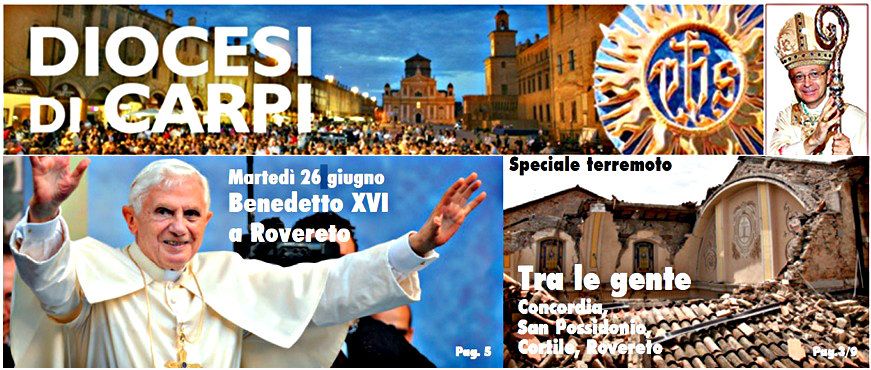
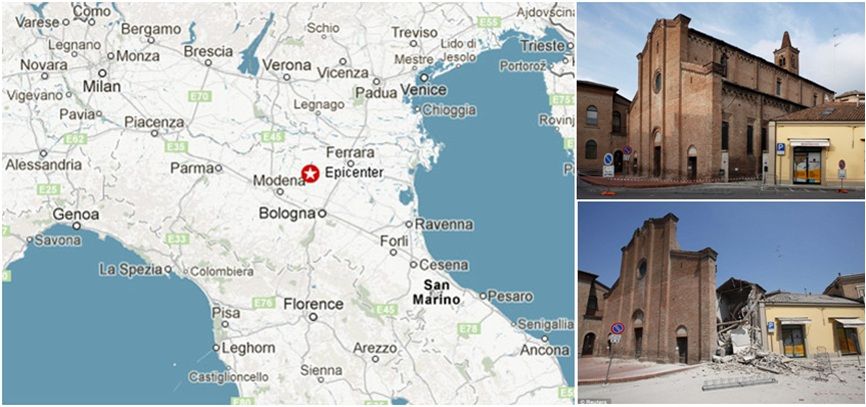 THE POPE IN ROVERETO
THE POPE IN ROVERETO
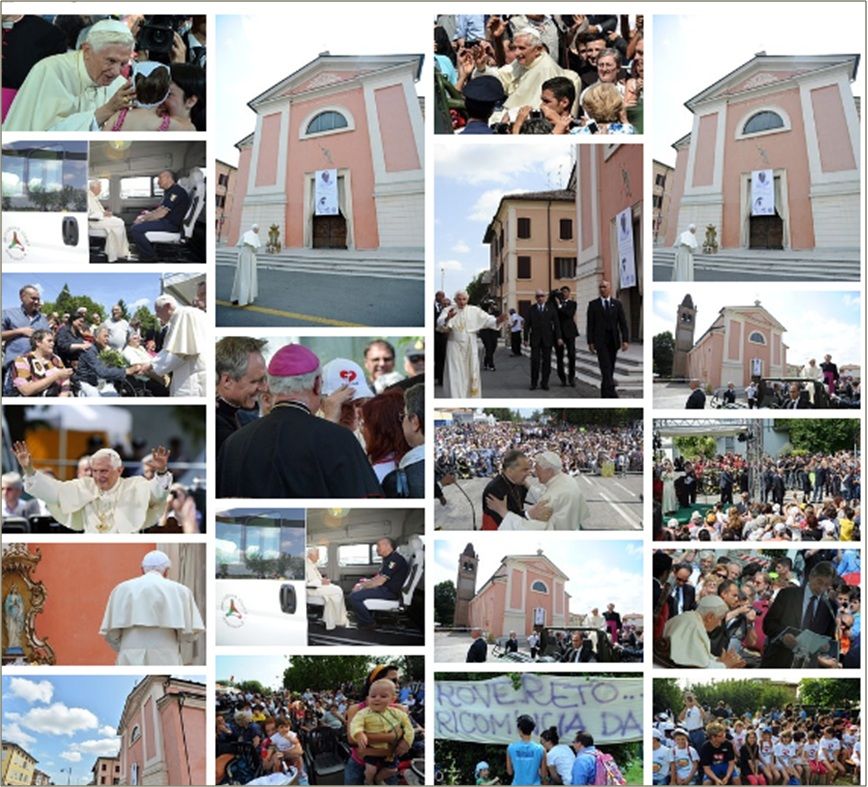 To earthquake victims:
To earthquake victims:
‘God is your rock’

June 26, 2012
Pope Benedict XVI flew up to Italy’s northern region of Emilia Romagna today to express his solidarity and pray with victims of a series of powerful earthquakes that devastated the area last month.
At least 12,000 people across a large swathe of north central Italy saw their homes destroyed or damaged and are living in tents and makeshift camps. Thousands braved the soaring temperatures and scorching sun to greet the Pope when he arrived in San Marino di Carpi outside Modena and hear his words of comfort. Tracey McClure reports:
A visibly moved Pope Benedict said he had been following their plight since the first quake struck May 20th and had remained “close to them in prayer and concern.”
But he said when he “heard their plight had become even harder, he felt an increasing need to come in person to be with them.”
In offering prayers for those families and communities who had lost loved ones in the destruction, the Pope said he “wanted everyone in every town to feel how the Pope’s heart is close to theirs to console them but above all to encourage and support” them.
Pope Benedict recalled flying over the stricken region on his way up to Milan in early June for the World Meeting of Families, saying he had wanted to visit them then and his “thoughts turned frequently to them.”
He said he knew that “besides suffering the material consequences, your souls were also tried by the continued tremors, even strong ones; and by the loss of several symbolic (historic) buildings of your towns…amongst which many churches.”
On his arrival in Rovereto di Novi, near Modena, Pope Benedict toured the “red zone,” the historic and hardest hit part of town where parish priest Ivan Martini died in the collapse of his church as he tried to rescue a statue of Our Lady.
Paying tribute to his memory, the Pope commended the local clergy for demonstrating “generous love for God’s people” and pointed to the comfort he found in reading Psalm 46 which recalls the trembling earth. In that passage, the Pope said God is seen as “our refuge and our fortress” especially in times of anguish and duress.
“On this rock, with this firm hope,” the pope said, “we can build, we can rebuild.” And likening the tragedy to post war Italy, the Pope reminded the quake victims that they are not alone and that their country “was rebuilt certainly thanks also to the help received, but above all thanks to the faith of so many people moved by the spirit of true solidarity.”
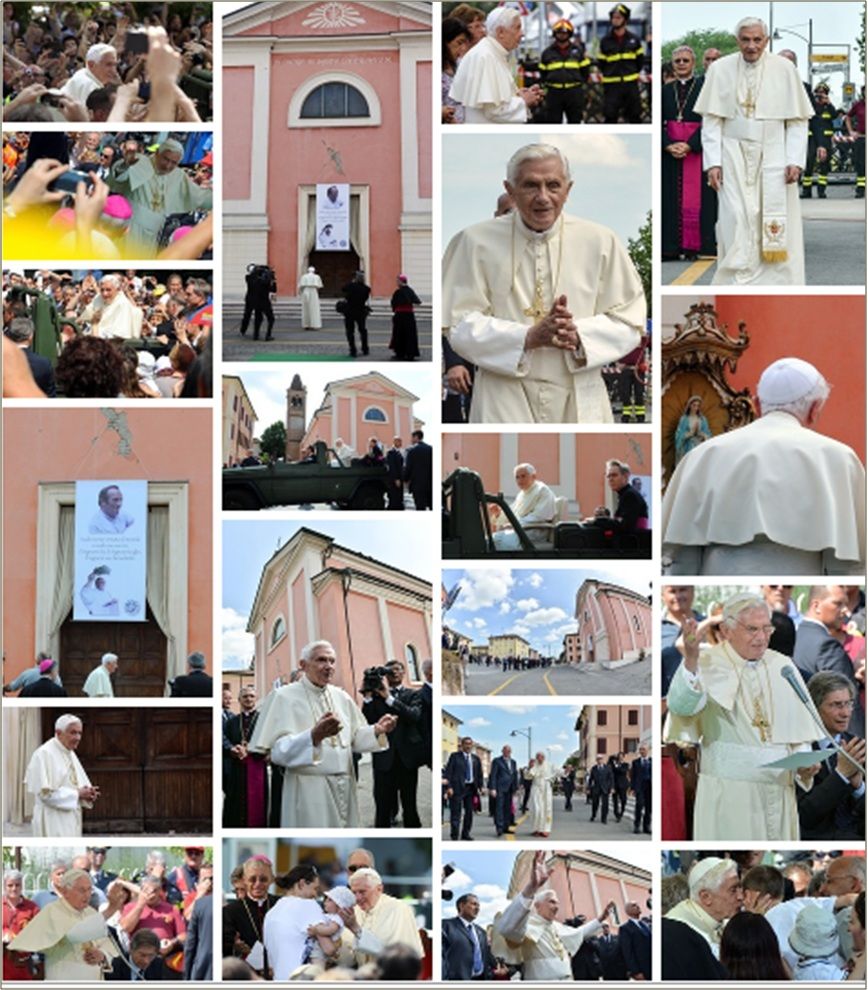 The Pope 's visit to Rovereto
The Pope 's visit to Rovereto

Vatican City, 26 June 2012 (VIS) - At 9 a.m. today the Holy Father departed by helicopter from the Vatican to fly to the Italian region of Emilia Romagna which, beginning on 20 May, has been affected by a series of earthquakes that have left many dead and hundreds of injured. The tremors have forced thousands of people to abandon their homes, destroyed historic buildings and seriously damaged the infrastructure and economy of the entire area.
The Pope's helicopter landed at 10.30 a.m. at the sports ground of San Marino di Carpi where he was welcomed by Bishop Francesco Cavina of Carpi and by Franco Gabrielli, head of the Italian Civil Protection Department.
The Pontiff then boarded a minibus to travel to Rovereto di Novi where he made a brief visit to the church of St. Catherine of Alexandria which partially collapsed during the earthquake killing the pastor Fr. Ivao Martini.
Subsequently the Holy Father boarded a Jeep from which he greeted the faithful while being driven to the central square of Rovereto di Novi where, in the presence of the archbishops and bishops of the affected areas (Bologna, Carpi, Modena, Mantua, Ferrara and Reggio Emilia) he delivered his address.
Ample extracts from the Holy Father's words are given below:
"Ever since the beginning of the earthquake which affected you I have been close to you with my prayers and concern. But when I saw that the trial had become more arduous, I felt the impelling need to come among you in person, and I thank the Lord for having enabled me to do so. Thus I greet all of you who are gathered here, as with my mind and heart I embrace all the villages and all the people affected by the earthquake, especially the families and communities mourning their dead. May the Lord welcome them into His peace".
"I was aware that, apart from suffering the material consequences, your spirits were also being sorely tried by the continuation of the seismic activity, including even strong tremors, and by the loss of certain symbolic buildings in your towns and villages, in particular many churches. Here in Rovereto di Novi in the collapse of a church - which I have just visited - Fr. Ivan Martini lost his life. Paying homage to his memory, I address a special greeting to you, dear priests, and to all confreres who, as has happened at other difficult moments in the history of these lands, are showing their generous love for the people of God.
"As you all know, we priests (as well as religious and no small number of lay people) daily pray the 'Breviary' which contains the Liturgy of the Hours, the prayer of the Church which marks the hours of the day. We pray the Psalms in an order which is the same for the entire Catholic Church. Why am I telling you this? Because in recent days I came across this expression in Psalm 46: 'God is our refuge and strength, a very present help in trouble'".
"These words seem to contrast with the fear we inevitably feel following an experience such as the one you have just been through; that is an immediate reaction, which can become more profound if the phenomenon is prolonged. However, the Psalm does not in fact refer to that kind of fear; and the confidence it expresses in not that of supermen untouched by normal feelings. The confidence expressed is that of the faith. Yes we may feel fear and anguish - even Jesus did - but above all is the certainty that God is with us. ... His Love is as solid as a rock. We see this Love in the crucified Christ; at one and the same time a sign of suffering and of love. This is the revelation of God Love, Who remained united to us even unto extreme abasement.
"On this rock, with this firm hope, we can build, we can rebuild. Italy was rebuilt on the postwar ruins, and not just material ruins, thanks also to help received, but above all thanks to the faith of so many people animated by a spirit of genuine solidarity, by the will to give a future to their families, a future of freedom and peace. You are a people whom all Italians respect for your humanity and sociability, for hard work and cordiality. These qualities have been dealt a harsh blow by the current situation, but this must not and cannot affect your identity as a people, your history and your culture. Remain faithful to your vocation as a fraternal and united people, and face everything with patience and determination, rejecting the temptations which are unfortunately always associated with such moments of weakness and need.
"The situation you are going through has highlighted an aspect which I hope will remain at the forefront of your minds: You are not and you will not be alone! Over these days, amidst so much destruction and pain, you have seen and felt how numerous people have expressed closeness, solidarity and affection through so many signs and concrete forms of assistance. My presence among you is intended to be another such sign of love and hope. Looking at you lands I have been profoundly moved by the sight of so many wounds, but I have also seen many hands extended to cure those wounds with you. I have seen that life restarts with force and courage, and that is the most beautiful and lustrous sign of all.
"From here I wish to launch an appeal to the institutions, and to all citizens, despite the difficulties of the current time, to be like the Good Samaritan of the Bible who did not walk by indifferent to the one in need, but lovingly tended him, helped him, remained at his side and took full responsibility for the other's needs. The Church is close and will remain close with her prayers and with the concrete help of her organisations, especially Caritas, which will also undertake to rebuild the social fibre of parish communities".
Having completed his address, the Holy Father greeted the civil and religious authorities present. He then returned to the sports ground of San Marino di Carpi where his helicopter took off at midday, arriving in Rome shortly after 1.30 p.m.

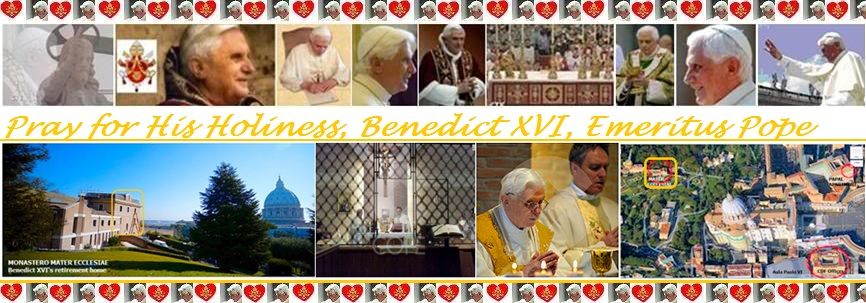
[Modificato da TERESA BENEDETTA 27/06/2013 02:54]